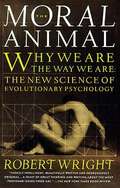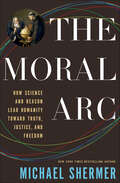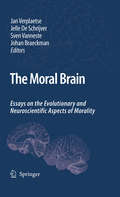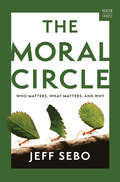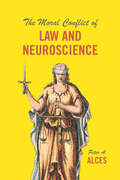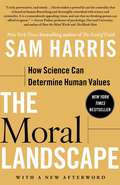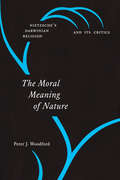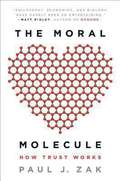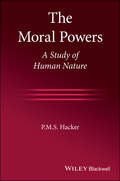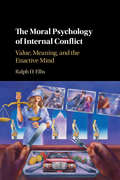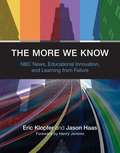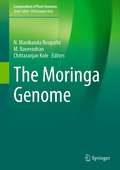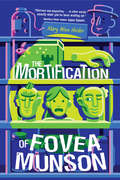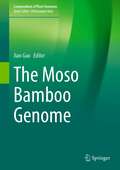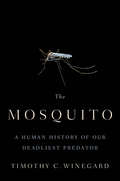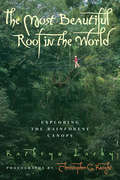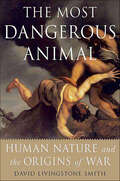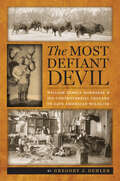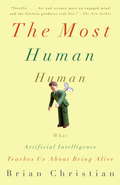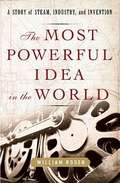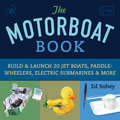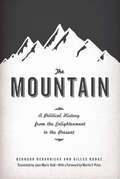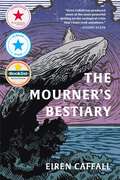- Table View
- List View
The Moral Animal: Why We Are, the Way We Are: The New Science of Evolutionary Psychology
by Robert WrightAre men literally born to cheat? Does monogamy actually serve women's interests? These are among the questions that have made The Moral Animal one of the most provocative science books in recent years. Wright unveils the genetic strategies behind everything from our sexual preferences to our office politics--as well as their implications for our moral codes and public policies. Illustrations.From the Trade Paperback edition.
The Moral Arc: How Science and Reason Lead Humanity Toward Truth, Justice, and Freedom
by Michael ShermerThe New York Times–bestselling author of The Believing Brains explores how science makes us better people.From Galileo and Newton to Thomas Hobbes and Martin Luther King, Jr., thinkers throughout history have consciously employed scientific techniques to better understand the non-physical world. The Age of Reason and the Enlightenment led theorists to apply scientific reasoning to the non-scientific disciplines of politics, economics, and moral philosophy. Instead of relying on the woodcuts of dissected bodies in old medical texts, physicians opened bodies themselves to see what was there; instead of divining truth through the authority of an ancient holy book or philosophical treatise, people began to explore the book of nature for themselves through travel and exploration; instead of the supernatural belief in the divine right of kings, people employed a natural belief in the right of democracy.In The Moral Arc, Shermer explains how abstract reasoning, rationality, empiricism, skepticism—scientific ways of thinking—have profoundly changed the way we perceive morality and, indeed, move us ever closer to a more just world.“Michael Shermer is a beacon of reason in an ocean of irrationality.” —Neil deGrasse Tyson“A memorable book, a book to recommend and discuss late into the night.” —Richard Dawkins“[A] brilliant contribution . . . Sherman’s is an exciting vision.” —Nature
The Moral Brain
by Johan Braeckman Jelle De Schrijver Jan Verplaetse Sven VannesteScientists no longer accept the existence of a distinct moral organ as phrenologists once did. A generation of young neurologists is using advanced technological medical equipment to unravel specific brain processes enabling moral cognition. In addition, evolutionary psychologists have formulated hypotheses about the origins and nature of our moral architecture. Little by little, the concept of a 'moral brain' is reinstated. As the crossover between disciplines focusing on moral cognition was rather limited up to now, this book aims at filling the gap. Which evolutionary biological hypotheses provide a useful framework for starting new neurological research? How can brain imaging be used to corroborate hypotheses concerning the evolutionary background of our species? In this reader, a broad range of prominent scientists and philosophers shed their expert view on the current accomplishments and future challenges in the field of moral cognition and assess how cooperation between neurology and evolutionary psychology can boost research into the field of the moral brain.
The Moral Circle: Who Matters, What Matters, and Why (A Norton Short)
by Jeff SeboA philosopher calls for a revolution in ethics, suggesting we expand our “moral circle” to include insects, AI systems, and even microbes. Today, human exceptionalism is the norm. Despite occasional nods to animal welfare, we prioritize humanity, often neglecting the welfare of a vast number of beings. As a result, we use hundreds of billions of vertebrates and trillions of invertebrates every year for a variety of purposes, often unnecessarily. We also plan to use animals, AI systems, and other nonhumans at even higher levels in the future. Yet as the dominant species, humanity has a responsibility to ask: Which nonhumans matter, how much do they matter, and what do we owe them in a world reshaped by human activity and technology? In The Moral Circle, philosopher Jeff Sebo challenges us to include all potentially significant beings in our moral community, with transformative implications for our lives and societies This book explores provocative case studies such as lawsuits over captive elephants and debates over factory-farmed insects, and compels us to consider future ethical quandaries, such as whether to send microbes to new planets, and whether to create virtual worlds filled with digital minds. Taking an expansive view of human responsibility, Sebo argues that building a positive future requires the shedding of human exceptionalism and radically rethinking our place in the world.
The Moral Conflict of Law and Neuroscience
by Peter A. AlcesLaw relies on a conception of human agency, the idea that humans are capable of making their own choices and are morally responsible for the consequences. But what if that is not the case? Over the past half century, the story of the law has been one of increased acuity concerning the human condition, especially the workings of the brain. The law already considers select cognitive realities in evaluating questions of agency and responsibility, such as age, sanity, and emotional distress. As new neuroscientific research comprehensively calls into question the very idea of free will, how should the law respond to this revised understanding? Peter A. Alces considers where and how the law currently fails to appreciate the neuroscientific revelation that humans may in key ways lack normative free will—and therefore moral responsibility. The most accessible setting in which to consider the potential impact of neuroscience is criminal law, as certain aspects of criminal law already reveal the naiveté of most normative reasoning, such as the inconsistent treatment of people with equally disadvantageous cognitive deficits, whether congenital or acquired. But tort and contract law also assume a flawed conception of human agency and responsibility. Alces reveals the internal contradictions of extant legal doctrine and concludes by considering what would be involved in constructing novel legal regimes based on emerging neuroscientific insights.
The Moral Landscape: How Science Can Determine Human Values
by Sam HarrisNew York Times bestselling author Sam Harris&’s first book, The End of Faith, ignited a worldwide debate about the validity of religion. In the aftermath, Harris discovered that most people—from religious fundamentalists to non-believing scientists—agree on one point: science has nothing to say on the subject of human values. Indeed, our failure to address questions of meaning and morality through science has now become the primary justification for religious faith.In this highly controversial book, Sam Harris seeks to link morality to the rest of human knowledge. Defining morality in terms of human and animal well-being, Harris argues that science can do more than tell how we are; it can, in principle, tell us how we ought to be. In his view, moral relativism is simply false—and comes at an increasing cost to humanity. And the intrusions of religion into the sphere of human values can be finally repelled: for just as there is no such thing as Christian physics or Muslim algebra, there can be no Christian or Muslim morality. Using his expertise in philosophy and neuroscience, along with his experience on the front lines of our “culture wars,” Harris delivers a game-changing book about the future of science and about the real basis of human cooperation.
The Moral Meaning of Nature: Nietzsche’s Darwinian Religion and Its Critics
by Peter J. WoodfordWhat, if anything, does biological evolution tell us about the nature of religion, ethical values, or even the meaning and purpose of life? The Moral Meaning of Nature sheds new light on these enduring questions by examining the significance of an earlier—and unjustly neglected—discussion of Darwin in late nineteenth-century Germany. We start with Friedrich Nietzsche, whose writings staged one of the first confrontations with the Christian tradition using the resources of Darwinian thought. The lebensphilosophie, or “life-philosophy,” that arose from his engagement with evolutionary ideas drew responses from other influential thinkers, including Franz Overbeck, Georg Simmel, and Heinrich Rickert. These critics all offered cogent challenges to Nietzsche’s appropriation of the newly transforming biological sciences, his negotiation between science and religion, and his interpretation of the implications of Darwinian thought. They also each proposed alternative ways of making sense of Nietzsche’s unique question concerning the meaning of biological evolution “for life.” At the heart of the discussion were debates about the relation of facts and values, the place of divine purpose in the understanding of nonhuman and human agency, the concept of life, and the question of whether the sciences could offer resources to satisfy the human urge to discover sources of value in biological processes. The Moral Meaning of Nature focuses on the historical background of these questions, exposing the complex ways in which they recur in contemporary philosophical debate.
The Moral Molecule: The Source of Love and Prosperity
by Paul J. ZakA Revolution in the Science of Good and EvilWhy do some people give freely while others are cold hearted?Why do some people cheat and steal while others you can trust with your life?Why are some husbands more faithful than others—and why do women tend to be more generous than men?Could they key to moral behavior lie with a single molecule?From the bucolic English countryside to the highlands of Papua New Guinea, from labs in Switzerland to his campus in Souther California, Dr. Paul Zak recounts his extraordinary stories and sets out, for the first time, his revolutionary theory of moral behavior. Accessible and electrifying, The Moral Molecule reveals nothing less than the origins of our most human qualities—empathy, happiness, and the kindness of strangers. .
The Moral Powers: A Study of Human Nature
by P. M. HackerA milestone in the study of value in human life and thought, written by one of the world’s preeminent living philosophers The Moral Powers: A Study of Human Nature is a philosophical investigation of the moral potentialities and sensibilities of human beings, of the meaning of human life, and of the place of death in life. It is an essay in philosophical anthropology: the study of the conceptual framework in terms of which we think about, speak about, and investigate homo sapiens as a social and cultural animal. This volume examines the diversity of values in human life and the place of moral value within the varieties of values. Its subject is the nature of good and evil and our propensity to virtue and vice. Acting as the culmination of five decades of reflection on the philosophy of mind, epistemology, ethics, and human nature, this volume: Concludes Hacker’s acclaimed Human Nature tetralogy: Human Nature: The Categorial Framework, The Intellectual Powers: A Study of Human Nature, and The Passions: A Study of Human Nature Discusses traditional ideas about ethical value and addresses misconceptions held by philosophers, psychologists, and cognitive neuroscientists The Moral Powers: A Study of Human Nature is required reading philosophers of mind, ethicists, psychologists, cognitive neuroscientists, and any general reader wanting to understand the nature of value and the place of ethics in human lives.
The Moral Psychology of Internal Conflict
by Ralph D. EllisPushing back against the potential trivialization of moral psychology that would reduce it to emotional preferences, this book takes an enactivist, self-organizational, and hermeneutic approach to internal conflict between a basic exploratory drive motivating the search for actual truth, and opposing incentives to confabulate in the interest of conformity, authoritarianism, and cognitive dissonance, which often can lead to harmful worldviews. The result is a new possibility that ethical beliefs can have truth value and are not merely a result of ephemeral altruistic or cooperative feelings. It will interest moral and political psychologists, philosophers, social scientists, and all who are concerned with inner emotional conflicts driving ethical thinking beyond mere emotivism, and toward moral realism, albeit a fallibilist one requiring continual rethinking and self-reflection. It combines 'basic emotion' theories (e. g. Panksepp) with hermeneutic depth psychology. The result is a realist approach to moral thinking emphasizing coherence rather than foundationalist theory of knowledge.
The More We Know
by Eric Klopfer Jason HaasIn 2006, young people were flocking to MySpace, discovering the joys of watching videos of cute animals on YouTube, and playing online games. Not many of them were watching network news on television; they got most of their information online. So when NBC and MIT launched iCue, an interactive learning venture that combined social networking, online video, and gaming in one multimedia educational site, it was perfectly in tune with the times. iCue was a surefire way for NBC to reach younger viewers and for MIT to test innovative educational methods in the real world. But iCue was a failure: it never developed an audience and was canceled as if it were a sitcom with bad ratings. In The More We Know, Eric Klopfer and Jason Haas, both part of the MIT development team, describe the rise and fall of iCue and what it can teach us about new media, old media, education, and the challenges of innovating in educational media. Klopfer and Haas show that iCue was hampered by, among other things, an educational establishment focused on "teaching to the test," television producers uncomfortable with participatory media, and confusion about the market. But this is not just a cautionary tale; sometimes more can be learned from an interesting failure than a string of successes. Today's educational technology visionaries (iPads for everyone!) might keep this lesson in mind.
The Moringa Genome (Compendium of Plant Genomes)
by Chittaranjan Kole N. Manikanda Boopathi M. RaveendranThis book provides updated and all-inclusive data and evidences for Moringa botany, cytogenetical analysis, genetic resources and diversity, classical genetics, traditional breeding, tissue culture, genetic transformation, whole-genome sequencing, comparative genomics and elucidation on applications of functional genomics, nanotechnology, bioinformatics, processing and value addition besides providing perspectives of medicinal and therapeutic properties of Moringa. Moringa gained global attention in the recent past owing to its unique blend of affordable nutraceutical and pharmaceutical compounds in all parts of the plants. Scientific literatures supporting its health benefits besides the studies on its utility in various fields are scattered on several reports. This book is written by renowned global subject experts by compiling and narrating it in a sober style.
The Morphology of Human Blood Cells (Seventh Edition)
by Ann Bell Sabah SallahThe book portrays the morphologic characteristics of normal and pathologic cells in blood and bone marrow. It will benefit medical students, student medical technologists, and other health science students who are learning to identify the various types of blood cells.
The Mortification of Fovea Munson
by Mary Winn HeiderFovea Munson is nobody's Igor. True, her parents own a cadaver lab where they perform surgeries on dead bodies. And yes, that makes her gross by association, at least according to everyone in seventh grade. And sure, Fovea's stuck working at the lab now that her summer camp plans have fallen through. But she is by no means Dr. Frankenstein's snuffling assistant!That is, until three disembodied heads, left to thaw in the wet lab, start talking. To her. Out loud. What seems like a nightmare, or bizarre hallucination, is not. Fovea is somebody's Igor, all right. Three somebodies, actually. And they need a favor.With a madcap sense of humor and a lot of heart (not to mention other body parts), this is a story about finding oneself, finding one's friends, and embracing the moment.
The Moso Bamboo Genome (Compendium of Plant Genomes)
by Jian GaoThis book is the first comprehensive compilation describing the botanical traits, genetic resources, whole genome sequencing, Mitochondrial genome, transcriptomes of different organs with developmental stages, transcription factors, delineating gene evolution of gene family in Bambusoideae, alternative splicing (AS) and polyadenylation, case studies for economically important traits such as internode length, shoot fast growing, flowering, ageing and stress-resistant genes and small RNAs-mediated gene regulation of moso bamboo flowering and other developmental stages. Applications of transcriptome and genome approaches in moso bamboo in general and the prospects of transgenic breeding and genome editing technologies in bamboo are also discussed. Altogether, the book comprises eleven chapters covered over 200 pages authored by the researchers involved in genomic science, molecular biology, and breeding. This book appeals to graduate students, post-graduate students, research scholars, researchers, and industry players in the field of plantation bamboo in general, bamboo processing and bamboo garden owner and fans of bamboo culture in particular.
The Mosquito: A Human History of Our Deadliest Predator
by Timothy C. WinegardA pioneering and groundbreaking work of narrative nonfiction that offers a dramatic new perspective on the history of humankind, showing how through millennia, the mosquito has been the single most powerful force in determining humanity’s fate Why was gin and tonic the cocktail of choice for British colonists in India and Africa? What does Starbucks have to thank for its global domination? What has protected the lives of popes for millennia? Why did Scotland surrender its sovereignty to England? What was George Washington's secret weapon during the American Revolution? The answer to all these questions, and many more, is the mosquito. Across our planet since the dawn of humankind, this nefarious pest, roughly the size and weight of a grape seed, has been at the frontlines of history as the grim reaper, the harvester of human populations, and the ultimate agent of historical change. As the mosquito transformed the landscapes of civilization, humans were unwittingly required to respond to its piercing impact and universal projection of power. The mosquito has determined the fates of empires and nations, razed and crippled economies, and decided the outcome of pivotal wars, killing nearly half of humanity along the way. She (only females bite) has dispatched an estimated 52 billion people from a total of 108 billion throughout our relatively brief existence. As the greatest purveyor of extermination we have ever known, she has played a greater role in shaping our human story than any other living thing with which we share our global village. Imagine for a moment a world without deadly mosquitoes, or any mosquitoes, for that matter? Our history and the world we know, or think we know, would be completely unrecognizable. Driven by surprising insights and fast-paced storytelling, The Mosquito is the extraordinary untold story of the mosquito’s reign through human history and her indelible impact on our modern world order.
The Most Beautiful Roof in the World: Exploring the Rainforest Canopy
by Kathryn Lasky Christopher G. KnightFrom Newbery Honor author Kathryn Lasky comes a fascinating journey through the rainforest canopy that's perfect for budding environmentalists. Journey along with Dr. Meg Lowman, a scientist who, with the help of slings, suspended walkways, and mountain-climbing equipment, has managed to ascend into one of our planet’s least accessible and most fascinating ecosystems.
The Most Dangerous Animal: Human Nature and the Origins of War
by David Livingstone Smith“Original and compelling insights into the human capacity for war . . . A must read for anyone interested in the psychological depths of human nature.” —Barbara S. Held, author of Back to RealityAlmost 200 million human beings, mostly civilians, have died in wars over the last century, and there is no end of slaughter in sight.The Most Dangerous Animal asks what it is about human nature that makes it possible for human beings to regularly slaughter their own kind. It tells the story of why all human beings have the potential to be hideously cruel and destructive to one another. Why are we our own worst enemy? The book shows us that war has been with us—in one form or another—since prehistoric times, and looking at the behavior of our close relatives, the chimpanzees, it argues that a penchant for group violence has been bred into us over millions of years of biological evolution. The Most Dangerous Animal takes the reader on a journey through evolution, history, anthropology, and psychology, showing how and why the human mind has a dual nature: on the one hand, we are ferocious, dangerous animals who regularly commit terrible atrocities against our own kind, on the other, we have a deep aversion to killing, a horror of taking human life.Meticulously researched and far-reaching in scope and with examples taken from ancient and modern history, The Most Dangerous Animal delivers a sobering lesson for an increasingly dangerous world.“Illuminates an exceedingly dark subject: humankind’s deep-seated penchant for war. The result is a discerning, insightful, highly original, and very disturbing book.” —Andrew J. Bacevich, author of The Age of Illusions
The Most Defiant Devil: William Temple Hornaday and His Controversial Crusade to Save American Wildlife
by Gregory J. DehlerThe late nineteenth and early twentieth century were a brutal time for American wildlife, with many species pushed to the brink of extinction. (Some are endangered to this day.) And yet these decades also saw the dawn of the conservationist movement. Into this contradictory era came William Temple Hornaday, a larger-than-life dynamo who almost uncannily embodies these conflicting threads in our history.In The Most Defiant Devil, a compelling new biography of this complex figure, Gregory Dehler explores the life of Hornaday the hunter, museum builder, zoologist, author, conservationist, and anti-Bolshevist crusader. A deeply religious man, he was nonetheless anything but peaceful and was racist even by his era’s standards, going so far as to display an Mbuti pygmy as a "living specimen" in a zoo. A passionate hunter, Hornaday killed thousands of animals, including some of the last wild buffalo in America, but he was far ahead of his time in his influential views on the protection of wildlife. Hornaday designed and built the New York Zoological Park (which became the Bronx Zoo) and was chief taxidermist for what would later become the Smithsonian Museum of Natural History.In this single, fascinating individual, we can discern some of the Progressive Era's most destructive forces and some of its most enlightened visions.
The Most Exciting Book of Science, Inventions, and Space Ever (Serendipity)
by DKTravel with mischievous cartoon guides, the Brainwaves, in this book of science through a range of mindblowing STEM topicsMeet the Brainwaves, hilarious little mischief-makers who will be your guides to a marvellous range of mindblowing science topics! These pint-sized pals will jump aboard the invention of the car, take you on a madcap holiday to Mars and outer space, and will even shrink down to atomic level to explore the most basic building blocks of science. The Most Exciting Book of Science, Inventions, and Space Ever has a bunch of scientific discoveries that kids aged 8-12 will love to learn about - from the wisest and wackiest inventions the world has ever seen to the adventures of pioneering astronauts, plus all the core information they need to know, such as the periodic table, energy, forces, and matter. Each exciting illustrated adventure is packed with amazing facts and core information to learn about – from why gravity sucks to how the Industrial Revolution was powered.This STEM book for children features: - Step by step guides that give precise detail on scientific discoveries, planets, inventions and more!- Quirky characters deliver witty facts and asides, with a special new character to look out for in each part of the bind-up.- Mini biographies and profiles of key figures, events, and features.- Key subject areas, such as science and space, that are presented in an inventive and whimsical way.With a host of colorful characters offering entertaining insights on each subject, the Brainwaves will both delight children&’s eyes and broaden their knowledge. Even the most reluctant readers will be absorbed, by hysterical artworks teeming with tiny, wise-cracking Brainwaves that bring each topic to life and make facts fun. Through their zany antics, readers can take a fantastical foray into a range of fields, learning about science, space, and discovering more than 300 inventions.
The Most Human Human: What Talking with Computers Teaches Us About What It Means to Be Alive
by Brian ChristianThe Most Human Human is a provocative, exuberant, and profound exploration of the ways in which computers are reshaping our ideas of what it means to be human. Its starting point is the annual Turing Test, which pits artificial intelligence programs against people to determine if computers can "think." Named for computer pioneer Alan Turing, the Turing Test convenes a panel of judges who pose questions--ranging anywhere from celebrity gossip to moral conundrums--to hidden contestants in an attempt to discern which is human and which is a computer. The machine that most often fools the panel wins the Most Human Computer Award. But there is also a prize, bizarre and intriguing, for the Most Human Human. In 2008, the top AI program came short of passing the Turing Test by just one astonishing vote. In 2009, Brian Christian was chosen to participate, and he set out to make sure Homo sapiens would prevail. The author's quest to be deemed more human than a computer opens a window onto our own nature. Interweaving modern phenomena like customer service "chatbots" and men using programmed dialogue to pick up women in bars with insights from fields as diverse as chess, psychiatry, and the law, Brian Christian examines the philosophical, biological, and moral issues raised by the Turing Test. One central definition of human has been "a being that could reason." If computers can reason, what does that mean for the special place we reserve for humanity?From the Hardcover edition.
The Most Powerful Idea in the World: A Story of Steam, Industry, and Invention
by William RosenIf all measures of human advancement in the last hundred centuries were plotted on a graph, they would show an almost perfectly flat line--until the eighteenth century, when the Industrial Revolution would cause the line to shoot straight up, beginning an almost uninterrupted march of progress. In The Most Powerful Idea in the World, William Rosen tells the story of the men responsible for the Industrial Revolution and the machine that drove it--the steam engine. In the process he tackles the question that has obsessed historians ever since: What made eighteenth-century Britain such fertile soil for inventors? Rosen's answer focuses on a simple notion that had become enshrined in British law the century before: that people had the right to own and profit from their ideas. The result was a period of frantic innovation revolving particularly around the promise of steam power. Rosen traces the steam engine's history from its early days as a clumsy but sturdy machine, to its coming-of-age driving the wheels of mills and factories, to its maturity as a transporter for people and freight by rail and by sea. Along the way we enter the minds of such inventors as Thomas Newcomen and James Watt, scientists including Robert Boyle and Joseph Black, and philosophers John Locke and Adam Smith--all of whose insights, tenacity, and ideas transformed first a nation and then the world. William Rosen is a masterly storyteller with a keen eye for the "aha!" moments of invention and a gift for clear and entertaining explanations of science. The Most Powerful Idea in the World will appeal to readers fascinated with history, science, and the hows and whys of innovation itself.
The Motorboat Book: Build & Launch 20 Jet Boats, Paddle-Wheelers, Electric Submarines & More (Science in Motion)
by Ed SobeyThere's more than one way to power a toy boat. Electric motors, balloons, gears, water jets, belt drives, chemical reactions, steam, and even gravity can be used to propel a small ship across a pool. Also, the boats' propellers and paddles can be side-mounted or at the stern, or even sit above the waterline, like a fan-powered swamp boat. The Motorboat Book will show children how to build more than 20 different models through step-by-step instructions with clear photos. And if they'd rather travel under the water than over it, the book has 6 different submarine projects. In addition to the boatbuilding activities, author Ed Sobey includes instructions on how to build an "ocean" to test the boats, as well as accessories such as four different water pumps, waterproof battery and motor cases, and a working foghorn. Most of the boats are built from recycled and easy-to-find materials, but an appendix lists local and online sources for wire, plastic propellers, small motors, and more. Educators will appreciate the Meeting Science Standards summary at the end of the book.
The Mountain: A Political History from the Enlightenment to the Present
by Bernard Debarbieux Gilles RudazIn The Mountain, geographers Bernard Debarbieux and Gilles Rudaz trace the origins of the very concept of a mountain, showing how it is not a mere geographic feature but ultimately an idea, one that has evolved over time, influenced by changes in political climates and cultural attitudes. To truly understand mountains, they argue, we must view them not only as material realities but as social constructs, ones that can mean radically different things to different people in different settings. From the Enlightenment to the present day, and using a variety of case studies from all the continents, the authors show us how our ideas of and about mountains have changed with the times and how a wide range of policies, from border delineation to forestry as well as nature protection and social programs, have been shaped according to them. A rich hybrid analysis of geography, history, culture, and politics, the book promises to forever change the way we look at mountains.
The Mourner's Bestiary
by Eiren CaffallA critically-acclaimed literary memoir braiding together environmental research and the personal journey of generational healing, grief, and chronic illness.Author Eiren Caffall is the inheritor of a family legacy of two hundred years of genetic kidney disease and the mother of a child who may inherit that legacy. A literary memoir on loss, chronic illness, and generational healing, Caffall&’s The Mourner&’s Bestiary is also a meditation on grief and survival told through the stories of animals in two collapsing marine ecosystems—the Gulf of Maine and the Long Island Sound—and the lives of a family facing a life-threatening illness on their shores. The Gulf of Maine is the world&’s fastest-warming marine ecosystem, and the Long Island Sound has been the site of conservation battles that predict the fights ahead for the Gulf. "Beguiling, idiosyncratic [...] Caffall writes with plangent intensity about our responsibility toward the planet, and her eye for the wonder and beauty of ocean life pierces the illusion of disconnected existence." ? Whiting Creative Nonfiction Grant judges citation "Eiren Caffall has produced some of the most powerful writing on the ecological crisis I have read anywhere. Caffall is a gifted writer, and this book is strong medicine." ? Naomi Klein, author, social activist, and filmmaker
